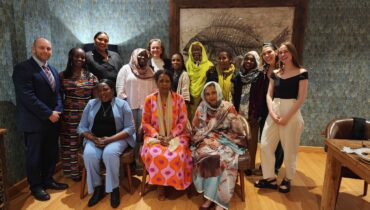This year, President Trump is mandated by Congress to create a strategy for implementing the Women, Peace and Security Act of 2017. GIWPS is part of the U.S. Civil Society Working Group on Women, Peace and Security, a civil society coalition committed to the implementation of the new law.
History
In 2011, the Obama Administration adopted a National Action Plan (NAP) on Women, Peace and Security (WPS), following recommendations made by the UN Security Council in the 1325 agenda. The 2011 NAP was launched by executive order, and therefore could have been repealed by another executive order. Between 2011 and 2017, several attempts were made in Congress to turn the policy into law, but none of these bi-partisan attempts succeeded until the WPS Act of 2017 was passed by Congress.
Why is the WPS Act so important?
It shows that Congress measured both the benefits of women’s participation and the risks of their exclusion in the field of international peace and security. Women are disproportionately affected by conflict, and yet they are often excluded from decision-making related to peace and security. Research shows that when women are invited to join peace talks, there is a greater chance of sustainable peace emerging. Women bring critical issues to the table that otherwise might not get addressed and are essential to sustaining peace. The 2017 WPS Act is groundbreaking recognition by Congress that women’s participation in the field of peace and security is not just an issue of importance to women, but a matter of global security.
Chances of implementation
The WPS Act benefits from specific legal strengths that make implementation more likely.
- Congress set out specific policy objectives and mandated the President to create a strategy for implementation. The President and his Administration are legally required to take action to fulfill the policy objectives of the Act.
- The President and relevant agencies are required to provide detailed reports on strategy, implementation, and effectiveness to Congress.
- The Act requires comprehensive training modules for diplomats, military professionals and other individuals deployed abroad on their protection duties, on protection rights, and on the specific needs of women in conflict.
- Congress requires that the WPS strategy be aligned with plans developed by other countries. In doing so, Congress is ensuring that the US strategy will not operate in isolation, but will join the international effort on women, peace and security.
Risk of partial implementation
- The bipartisan WPS Act is the result of compromise. There are several changes between the final text and previous versions that dilute the language of the Act. For example, the Act requires that the President “encourage the increase” of the participation of women in programs funded by the US that provide training to foreign nationals regarding law enforcement. A previous version had required this increase.
- The WPS Act lacks definitions on key terms, such as “meaningful participation” of women; a previous version had included a definition.
- The Act does not include a provision for shadow reporting or civil society engagement.
- It is unclear whether the current NAP developed under the Obama Administration will be the WPS strategy for the next four years, or whether the Trump Administration wil introduce a new strategy.
- Perhaps most importantly, funding remains a question. It is unclear whether agencies will have sufficient funding to implement the WPS strategy.
Despite its shortcomings, the WPS Act is groundbreaking for advancing the role of women in peace and security. The clear policy objectives (on conflict prevention, meaningful participation, violence against women, equal access to relief and aid, gender data, gender equality and empowerment), as well as the requirement of a government-wide strategy to increase women’s participation in security and peace efforts, are now secured in law. Considering the support in Congress for the bill, one can hope that future legislative oversight will ensure developments in US foreign policy regarding women, peace and security.
Sophie Huve is the 2017-2018 Hillary Rodham Clinton Law Fellow with the Georgetown Institute for Women, Peace and Security. She received her LLM in International Legal Studies at Georgetown University Law Center, with a certificate in International Human Rights.


